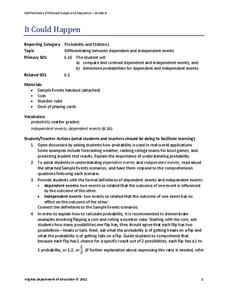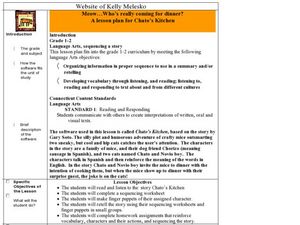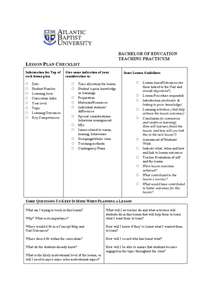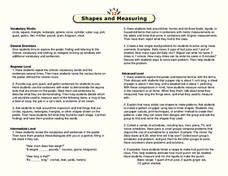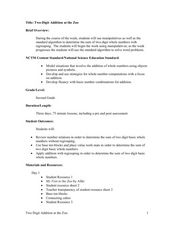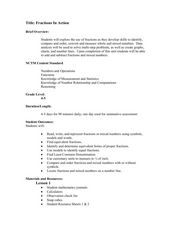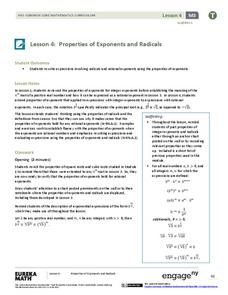Curated OER
Probability
How likely is a new baby to be a boy? Or for snow to fall in August? Mark the likelihood of various events on probability lines. For extra practice, have your fourth and fifth graders make up different scenarios in their lives to...
Curated OER
Classifying Three-Dimensional Shapes
Compare geometric solids based on their properties. Your emergent geometers use spaghetti and marshmallows to build models so they can examine the number of faces, edges, and vertices on polyhedra of their own creation. Resource includes...
University of Colorado
Rings and Things
Galileo first observed Saturn's rings in 1610. Through the use of a flashlight and baby powder, classes see how they can observe the rings of the outer planets from far away. Another demonstration shows how these rings, made of ice and...
EngageNY
Conducting a Simulation to Estimate the Probability of an Event
How can you complete a simulation when it is not practical to determine the probability of an event? Class members learn that in some situations, it is not feasible to find the probability of an event, but they can estimate it by running...
Curated OER
Measuring Real Stuff
Looking for a good lesson on measurement? This one could be for ytou! Learners select and use appropriate nonstandard units to measure and compare lengths and weights of real-life objects. They use problem-solving skills to design a...
Calvin Crest Outdoor School
Survival
Equip young campers with important survival knowledge with a set of engaging lessons. Teammates work together to complete three outdoor activities, which include building a shelter, starting a campfire, and finding directions in the...
EngageNY
Exponents
Powered up! Here's a great resource on exponents. Scholars build on their previous understanding of exponents to include all positive real number bases. Distinguishing between an and a^n is a major goal in the fifth activity of a 36-part...
Virginia Department of Education
It Could Happen
Understanding of probability will probably increase with the use of a refined resource. Pupils learn to distinguish between dependent and independent events as they calculate the probabilities of these types of events in various situations.
Curated OER
Lesson Plan for Chato's Kitchen
Through an exploration of Chato's Kitchen by Gary Soto, learners practice sequencing skills, retelling a story, and Spanish vocabulary words. All of the necessary resources, worksheets, and other materials are provided in order to give...
Curated OER
Rounding Decimals
Fourth graders engage in a lesson that is about the concept of rounding decimals. They review place value and focus it upon the practice of rounding. Students use 10 base decimal grids or models to help make connections with the skill.
Curated OER
Draw an Inch, Walk a Mile
Students work in small groups to solve the problems presented. The main project, mapping the classroom, use these discussions to collaborate in creating a tangible demonstration of their understanding.
Curated OER
Number Search in Monterey Bay Aquarium
Youngsters search for an animal with body parts for each number from one to ten during a field trip to an aquarium. They count rays, fins, feet, gills, eyes, spots or anything. When they get back to the classroom, they compile their...
Pyro Innovations
Get into Shape
Shapes are so fun! Little ones explore, identify, and create shapes using tangrams or pattern blocks. The activity is intended to stimulate critical thinking while engaging learners through play and shape identification. Each child will...
Houghton Mifflin Harcourt
Shapes and Measuring
Youngsters develop mathematical vocabulary with this worksheet. First, give youngsters time to identify their vocabulary words in the picture provided. Then, as a group, practice saying the vocabulary words aloud. Finally, have learners...
Curated OER
Density Problems
In this density worksheet, students are given 11 problems and they determine the density of the substance, the mass of the substance or the volume. They write the equation they use to solve the problem, they show their work and they box...
Curated OER
Sizing Cells
Young scholars examine how living cells reproduce to make new cells. In this cell reproduction lesson students complete a lab activity and answer questions.
Curated OER
Two-Digit Addition at the Zoo
Your second graders explore two digit addition with regrouping. They will investigate problem solving strategies within the context of a trip to the zoo. Multiple resources and assessments are provided.
Curated OER
Fractions in Action
Investigate equivalent fractions with your class. They compare and order fractions. Then they work cooperatively in groups to experiment and problem solve with fractions using a game format. Multiple resources are provided.
Curated OER
From Quotation to Interpretation in Informational Texts
How to ignite thoughtful written responses with the words of philosophers, artists, and current events.
Illustrative Mathematics
Find The Numbers 0-5 or 5-10
In need of math station or center for your kindergartners? Model how to play this game with the whole class first and then make it into a center. Create a few sets of six number cards with 0-5 or 5-10 and then create a matching die with...
Illustrative Mathematics
3-D Shape Sort
From the apple on your desk and the coffee cup in your hand, to the cabinets along the classroom wall, basic three-dimensional shapes are found everywhere in the world around us. Introduce young mathematicians to the these common figures...
Laura Candler
Fishbowl Multiplication
Transition young mathematicians from using repeated addition to multiplication with this fun, hands-on activity. Using manipulatives and the included game board, students work in pairs modeling repeated addition problems before...
EngageNY
Properties of Exponents and Radicals
(vegetable)^(1/2) = root vegetable? The fourth installment of a 35-part module has scholars extend properties of exponents to rational exponents to solve problems. Individuals use these properties to rewrite radical expressions in terms...
Mathed Up!
Nets, Plans, and Elevations
A dimensional resource teaches viewers to recognize 2-D views of 3-D objects and how to match nets with their 3-D figures. Individuals draw different views of three-dimensional objects including views from the front, side elevations and...









